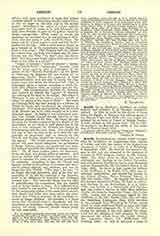

Arnoldi, BARTITOLOMAUS, usually called Usingen, after his birthplace, an Augustinian friar, teacher of Luther, and with him inmate of the Augustinian monastery at Erfurt; b. in 1463; d. at Würzburg, September 9, 1532. He received his master’s degree in 1491 and was promoted to the doctorate of divinity in 1514 (Jürgens, Luther, I, 430, Leipzig, 1846). For thirty years he filled the chairs of philosophy and theology at the Erfurt University, and with Jodocus Truttfetter was its most illustrious teacher (Kampschulte, Die Universitat Erfurt, I, 46, Trier, 1858). He stood in high repute for holiness of life (DeWette, I, 19; Walch, XXI, 532), rare intellectual endowments, and unswerving loyalty to the Church (Krause, Helius Eobanus Hessius, I, 339, 352, Gotha, 1879). He enjoyed the favor of the younger humanists (Eoban, De laud. et praecon. incl. Gymnas. lit. ap. Erphordiam, A. a. b. Erph., 1507), was lauded as a dialectician and logician, and was Luther’s teacher in both these branches (Kolde, Die deutsche Augustiner Congr., 245, Gotha, 1879). Luther had an affectionate regard for him (DeWette, I, 38, 256; Walch, XXI, 552) and after the Heidelberg Disputation (May, 1518) travelled in his company from Wurzburg to Erfurt, during which he made ineffectual efforts to wean him from his ecclesiastical allegiance (ib., I, 112). In 1521, during the uprising of the mob against the priesthood and the pillaging of their property, he boldly denounced the rioters from the pulpit (Paulus, Der Augustiner Monch Joh. Hoffmeister, 125, Freiburg, 1891). In 1522 he delivered a series of sermons in the cathedral in defense of the Church, arraigning the inactivity of the civil and ecclesiastical authorities, and predicted the revolution which finally culminated in the Peasants’ War. His anti-Reformation attitude and utterances embittered Luther, who now violently assailed his old teacher (DeWette, II, 204, 213, 224, 225). His removal to Würzburg in 1526, did not interrupt his activity against the innovators. In 1530 he accompanied the Bishop of Würzburg to the Diet of Augsburg. Returning, he died at Würzhurg.
HENRY G. GANSS

